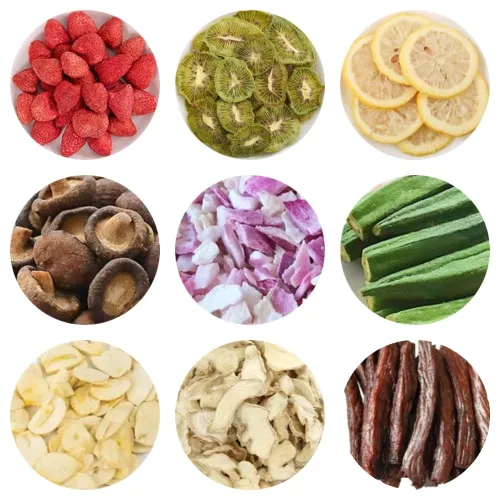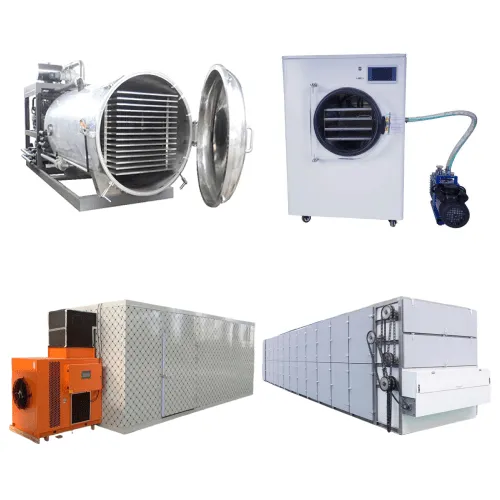Defining Commercial Dehydrators
Commercial dehydrators are heavy-duty machines engineered for high-volume food dehydration, featuring industrial-grade construction, expanded capacity, and superior processing speeds compared to residential units.
Leading paragraph: Tired of dehydrators that struggle with continuous operation? Commercial-grade dehydrators eliminate the limitations of small-scale models by effortlessly handling large batches and non-stop workloads.
Dive-Deeper paragraph:
Industrial food dehydrators excel in three critical aspects:
-
Capacity
- Residential: 5–10 trays (1–5 kg per batch)
- Commercial: 15–30+ trays (10–50 kg per batch)
-
Durability
- Constructed with stainless steel or reinforced polymers
- Heavy-duty motors built for 18+ hours of daily operation
-
Efficiency
- Rapid dehydration with high-power fans (500–2000W vs. 300W in home units)
- Precision heat distribution for uniform results
Example: The Excalibur 3926TB (26-tray model) dehydrates 15 kg of apples in just 8 hours, whereas a standard home unit might require 24 hours for only 2 kg.
Curious how these large-capacity dehydrators perform in professional settings? The next section explores their real-world industrial applications.
Industrial Applications of Commercial Dehydrators
From food processing to agriculture, commercial-grade dehydrators are indispensable for large-scale drying operations. These heavy-duty dehydrators combine high capacity, precise temperature control, and durable construction to meet the unique demands of each industry.
Leading paragraph:
Businesses across sectors rely on industrial food dehydrators to handle intensive workloads efficiently. Designed for continuous operation, these large-capacity dehydrators deliver consistent performance while catering to industry-specific requirements.
Dive-Deeper paragraph:
Commercial dehydrators serve distinct purposes across key industries:
-
Food Processing:
- Ideal for mass production of dried fruits, vegetables, meats, and herbs.
- Precise temperature control (95°F–165°F) preserves nutritional value and flavor integrity.
- Must adhere to strict food safety regulations (FDA, HACCP compliance).
-
Hospitality (Restaurants, Hotels):
- Streamlines bulk preparation of ingredients like jerky and fruit chips.
- Space-efficient designs and rapid drying cycles optimize kitchen workflows.
-
Agriculture:
- Processes crops (grains, herbs) for storage or commercial distribution.
- High-yield models (50–200 lbs per batch) with energy-saving features reduce operational costs.
Key differences in requirements:
| Industry | Capacity Needs | Temperature Range | Special Features |
|---|---|---|---|
| Food Processing | Very high (100+ lbs) | 95°F–165°F | Stainless steel, hygienic design |
| Hospitality | Moderate (20–50 lbs) | 100°F–160°F | Compact footprint, quick cycles |
| Agriculture | Extremely high (50–200 lbs) | 90°F–155°F | Weather-resistant, low energy consumption |
For instance, a snack producer might select a 30-tray stainless steel dehydrator, while farms often prioritize solar-assisted models for sustainability.
Interested in discovering top-performing commercial dehydrators for your sector? The following section highlights leading models and their specifications.
Top Brands and Models for Commercial Use
When businesses need to dehydrate food at scale, residential models simply can't keep up. Commercial-grade dehydrators are designed to handle high-volume processing with robust builds, faster drying times, and bulk-loading capabilities. Here’s what sets the top performers apart.
The best industrial food dehydrators strike a balance between capacity, durability, and energy efficiency. Leading brands like Excalibur, Tribest, and STX International offer heavy-duty dehydrators with large capacities (10+ trays), industrial-grade heating elements, and precision temperature controls. Here’s a closer look at standout models:
- Excalibur 9-Tray: Boasts 15 sq. ft. of drying space, a 600W motor, and an adjustable thermostat (68–167°F). Perfect for medium-scale operations like bakeries or herb drying.
- Tribest Sedona Express: Features 10 trays, a dual-fan system for even drying, and stainless steel construction. A favorite for health food producers.
- STX Turboforce 1000: Delivers 1000W power, 12 trays, and digital controls. A top choice for meat jerky businesses thanks to its rapid dehydration.
Comparison of Top Models
| Model | Capacity | Power | Key Feature | Best For |
|---|---|---|---|---|
| Excalibur 9-Tray | 15 sq.ft | 600W | Parallex heating (no rotation) | Herbs, fruits |
| Tribest Sedona | 10 trays | 850W | Dual fans | Raw food businesses |
| STX Turboforce | 12 trays | 1000W | Digital timer | High-volume jerky |
For businesses where hygiene is critical (e.g., shared kitchens), prioritize models with NSF certification. Next, we’ll explore how to choose the right large-capacity dehydrator based on your specific needs.
Choosing the Right Commercial Dehydrator
Selecting the right commercial dehydrator hinges on four key factors: production volume, energy efficiency, maintenance needs, and budget.
Choosing among industrial food dehydrators isn’t just about physical size—it’s about aligning the equipment with your actual operational requirements. A poor match can result in energy waste, inflated costs, or production delays.
Here’s a practical framework for your decision:
-
Volume Needs
- Small-scale businesses (e.g., artisanal food producers) typically require 10–20 trays.
- Large food processors often need heavy-duty dehydrators with 30+ trays or continuous-batch systems.
- Evaluate drying time per batch—slower models struggle with high-demand scenarios.
-
Energy Efficiency
- Modern heat pump dehydrators consume 30–50% less energy than traditional electric units (source: USDA energy reports).
- For regulated industries like pharmaceuticals, prioritize NSF-certified commercial-grade dehydrators.
-
Maintenance Considerations
- Stainless steel construction resists corrosion but costs 20–40% more than aluminum alternatives.
- Conveyor belt systems reduce labor but require daily cleaning maintenance.
-
Budget Trade-offs
| Feature | Entry-Level ($2k–$5k) | Professional-Grade ($8k–$20k) |
|---|---|---|
| Material | Aluminum | Stainless steel |
| Automation | Manual operation | Programmable controls |
| Lifespan | 3–5 years | 10+ years |
Expert tip: Request demo units from suppliers—many offer 30-day trials for commercial clients.
Interested in top-performing large-capacity dehydrators? The next section analyzes leading market models.
Where to Buy and Price Ranges
Leading paragraph: Finding the right commercial dehydrator involves balancing budget, supplier reliability, and post-purchase support—here’s how to navigate your options for industrial food dehydrators that meet your needs.
Snippet paragraph: Commercial-grade dehydrators are available through online retailers (Amazon, WebstaurantStore), specialty food equipment suppliers, and local distributors. Prices range from $500 for basic models to $10,000+ for heavy-duty dehydrators, with bulk purchase discounts often available for large-capacity dehydrators.
Dive-Deeper paragraph:
-
Online Suppliers:
- Amazon Business: Offers mid-range models like the Excalibur 9-tray (~$1,200) with fast shipping but limited bulk discounts.
- WebstaurantStore: Specializes in heavy-duty units such as the Harvest Saucer FD-1000 (~$8,500), ideal for restaurants with volume pricing.
- Direct Brands: Manufacturers like Nesco and L’Equip sell directly via their websites, often including warranties and custom configurations for commercial dehydrators.
-
Offline Suppliers:
- Local restaurant supply stores (e.g., Restaurant Depot) allow hands-on testing but typically stock fewer high-capacity models.
- Industrial equipment auctions (e.g., BidSpotter) can offer used commercial-grade dehydrators at 30-50% below retail.
-
Price Tiers:
Tier Price Range Example Models Best For Entry $500–$2,000 Excalibur 3926TB Small bakeries Mid $2,000–$6,000 L’Equip Pro Meal prep services Industrial $6,000+ Harvest Right Large-scale farms -
Bulk Purchases:
Suppliers like KaTom Restaurant Supply offer 5-15% discounts for orders of 5+ units. Always negotiate maintenance packages, such as free parts for 1 year, to maximize value for your industrial food dehydrator investment.
Want to ensure your dehydrator meets industry demands? The next section breaks down key features for commercial success.



